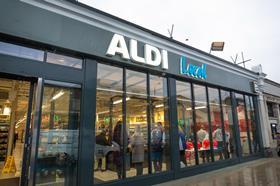
Aldi’s new brand Aldi Local isn’t a move into convenience shopping, according to the discounter, but rather an attempt to help shoppers distinguish between it and conventional stores.
The first Aldi Local store opened last month in Balham, south London, prompting talk that the company was moving into convenience retail, with smaller stores in more locations.
A spokesperson for the supermarket said the main difference between the Local store and conventional Aldis is that it doesn’t sell bulkier items that shoppers would have difficulty transporting without a car. The new Balham shop also sells 300 fewer products than a standard store.
“This isn’t a move into convenience retailing - Balham is 600 square metres in size, more than twice the size of a typical convenience store,” the spokesperson said.
“The number of products and the product mix in Balham is similar to Aldi’s other city stores. In addition, none of the city stores have Special Buys, though these products are available online as usual.”
As with other convenience stores, prices on certain lines are higher at the Aldi Local than conventional stores too. “The prices on certain lines in Balham are five per cent higher than in Aldi’s existing city stores and conventional sized Aldis. The prices are still notably cheaper than nearby supermarkets in Balham, and prices are reviewed daily.”
The company revealed that the brand was a trial which “will be evaluated before any decision is made whether to continue with this branding”.
Aldi is now on the brink of breaking into the “big four” bracket of supermarkets, having achieved over ten per cent annual sales growth rates in recent years. Its UK market share now stands at eight per cent.
According to Kantar data, 13 million shoppers passed through its aisles in the first three months of 2019, a larger number than at Morrisons.
Head of retail and consumer insight at Kantar, Fraser McKevitt, said: “London holds potential for Aldi – as both its fastest-growing region and where its market share is currently lowest – going some way to explain the recently announced trial of the smaller Aldi Local format in the capital.”



